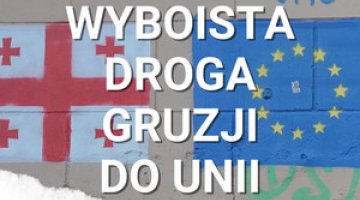Georgia: threat of destabilisation after local elections

On 30 October, the second round of local elections was held in Georgia. The candidates of the ruling Georgian Dream – Democratic Georgia (GD) party won the mayoral elections in 19 of the 20 largest cities, including the capital Tbilisi, where the incumbent Kakha Kaladze won 55.6% of the votes (his rival Nika Melia, the leader of the main opposition party the United National Movement [UNM], won 44.4%). The UNM’s only mayor will be in the city of Tsalenjikha in western Georgia. Nationally, GD will remain the dominant power in local government, winning in the first round (on 2 October) 46.7% of the votes (the UNM got 30.7%, and the For Georgia group, founded by the former prime minister and longtime GD politician Giorgi Gakharia, won 7.8%). The opposition has claimed (without presenting any evidence) that the elections were ‘stolen’ and ‘totally rigged’, and is announcing very large-scale street protests.
In the opinion of the ODIHR/OSCE mission, the voting was well organised and proceeded calmly, although the deepening polarisation and sharpening rhetoric had a negative influence on the election process, and the party in power benefited from its very large advantages in terms of resources (referring to the so-called administrative factor). This opinion has been shared by the EU and US diplomatic representations in Tbilisi, whose statements also drew attention to reports of intimidation and pressure on voters (the EU spoke of a ‘lost opportunity’ to eliminate the shortcomings revealed during previous votes). At the same time, the statements described the election campaign as having been genuinely competitive.
Commentary
- The elections took place amid a very serious internal political crisis and a growing conflict in Tbilisi’s relations with the European Union and the United States (see Georgia: elections in the shadow of Saakashvili’s return). GD’s continued success stems primarily from the fact that, in the eyes of most voters, it is the only force capable of ensuring minimal stability in the country (a possible return to power for the UNM, which dominates the opposition camp, is associated in their opinion with the risk of shocks which could have unpredictable consequences). This belief is probably also influenced by the situation around the imprisonment of the former president and historic leader of the UNM, Mikheil Saakashvili. Secondly, the longer GD remains in power – since autumn 2012, it has won parliamentary elections three times and local elections three times, and candidates it supports have won the presidential elections twice – the number of this party’s ‘clients’, who owe it a job and a career, has been rising. These people form the basis of the so-called administrative factor, which has made it easier for GD to win a series of victories and reduce the opposition’s chances.
- The opposition enjoys steady support from around a third of voters, but this does not translate into its wielding power – which some mayoral victories in the largest urban centres would mean – and that gives rise to frustration. As the UNM has not been able to prove that the elections were rigged ‘mechanically’ (after the second round, the votes in 10% of the electoral commissions were recounted, but the results did not differ from those originally given), it has instead referred to the bad practices indicated in the statements from the ODIHR/OSCE and Western representations, and on this basis it claims that the ruling camp has lost its legitimacy. The opposition’s main aim is to bring about early parliamentary elections (which GD has ruled out), and also to have Saakashvili released. The UNM and the smaller opposition groups will primarily strive to achieve this through street actions, although it is hard to expect that they would assemble enough genuinely determined participants to force the authorities to make concessions (the next demonstration is scheduled for Saturday 6 November). They may also make attempts to paralyse state institutions, especially the parliament. Several representatives of the UNM and smaller parties have responded positively to Saakashvili’s appeal for opposition deputies to resign from their seats. These actions may lead to a gradual destabilisation of the situation in the country.
- The case of Saakashvili is significantly affecting the internal situation. The former president, who returned to the country illegally after eight years abroad, has been in prison since 1 October; he is awaiting two final court judgements, and three further cases against him are pending. He has effectively been conducting a hunger strike since his arrest; this now poses a threat to his health, and possibly also his life. The authorities are ready to transfer him from the prison in Rustavi, where he is now, to the hospital in Gldani prison in Tbilisi; however he has not agreed to this, claiming that he could be murdered there (he wants to be treated in a clinic outside the penitentiary system, but the government has in turn not consented to this, pointing to the threat that unmanageable riots could erupt around such a place). Saakashvili has been actively commenting on the events in Georgia and making appeals to his supporters; after the second round of the elections, he called on Georgians to follow the example of the 2018 revolution under Nikol Pashinyan in Armenia and overthrow the government. Such statements are obviously increasing tension in the country and deepening internal polarisation (both supporters and opponents of the former president are demonstrating in front of the prison). At the same time, the steps taken against Saakashvili are being closely monitored by the EU and Western countries. Any violations of his human rights will deepen the tensions between Tbilisi, Brussels and other capitals (in recent days several of the former president’s associates from Ukraine have been refused entry to Georgia; Saakashvili still holds a Ukrainian passport).





